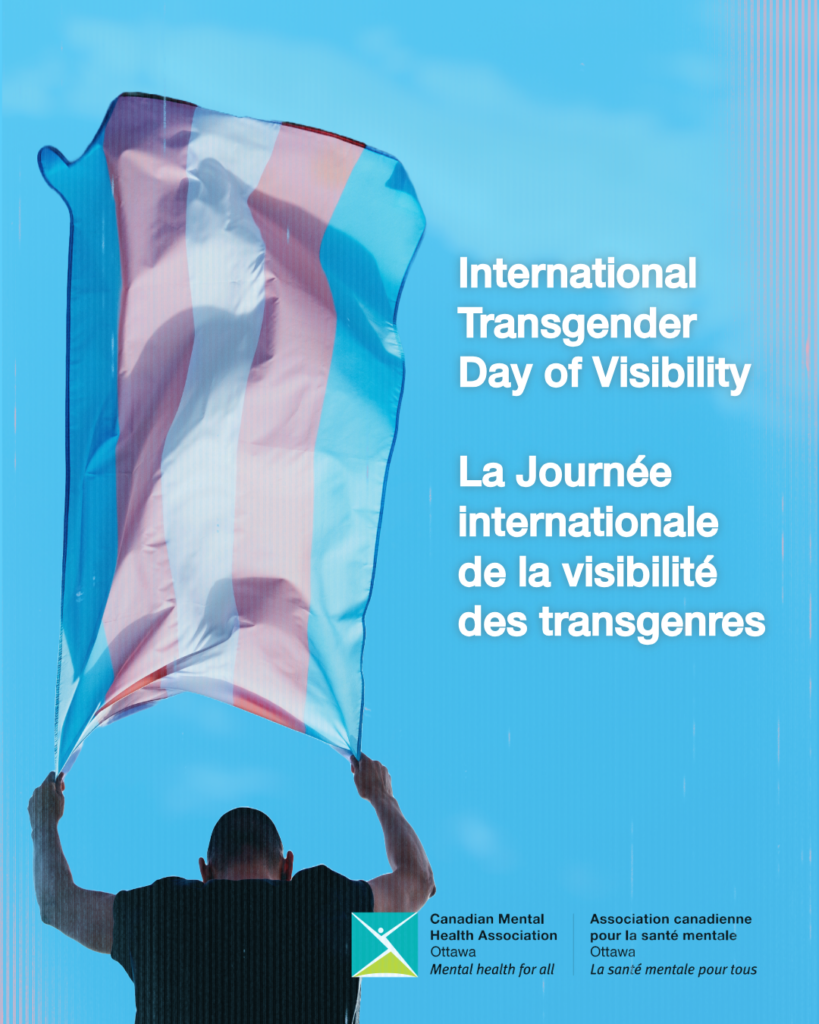Menu
Close

CMHA Ottawa supports the International Transgender Day of Visibility
Mar 30, 2025
March 31 marks the International Transgender Day of Visibility, an opportunity to celebrate the accomplishments of transgender people worldwide, while recognizing their resilience and combatting the systemic and individual oppression they face.
A transgender person is someone whose gender identity is different from the gender they were assigned at birth. CMHA Ottawa stands with the local transgender community and individuals, and recognizes the prejudices and barriers transgender people face in society. At CMHA Ottawa, we are proud to strive toward allyship with the trans community, and provide safe and culturally-competent programs and services for clients who are trans, gender-diverse, or are part of the 2sLGBTQIA+ community.
To bolster those efforts, this spring, our branch’s Gender, Sexuality and Diversity (GSD) Committee and management are ensuring all CMHA Ottawa staff receive vital training in 2sLGBTQIA+-inclusive practices, with the help of our friends at Family Services Ottawa.
Transgender and non-binary people have always been here—and today (and every day), we celebrate them.
March 31st marks International Transgender Day of Visibility (TDOV), an annual event dedicated to recognizing the achievements, resilience, and contributions of transgender and non-binary people around the world.
Trans and non-binary identities have existed for centuries, long before Western terminology. From Two-Spirit identities in Indigenous cultures to hijras in South Asia, gender diversity is deeply rooted in global history. While issues facing transgender communities have gained more visibility in recent years, trans people have been advocating for their rights for generations.
The mental health impact of transphobia:
Despite progress, transgender and non-binary individuals continue to experience discrimination in healthcare, employment, and daily life, contributing to higher rates of mental health challenges.
- Only 34% of transgender individuals rate their mental health as positive, compared to 72% of cisgender individuals (Statistics Canada, 2018).
- Nearly half of transgender individuals have seriously contemplated suicide.
- 61% have been diagnosed with a mood or anxiety disorder.
Barriers to affirming healthcare, stigma, and systemic discrimination all contribute to these disparities. Trans people deserve mental health care that affirms and supports them.
Transgender people are at higher risk of experiencing discrimination, harassment, and violence compared to the general population. This includes discrimination in employment, housing, and healthcare settings. As a result, transgender individuals are more likely to experience mental health issues such as depression, anxiety, and suicidality.
For additional information on mental health services for gender-diverse individuals, please check out the following resources:
- Invisible Intersections: A Toolkit on Supporting 2SLGBTQ+ Students on Campus
- Mental health services for gender-diverse and sexual-minority youth (ontario.cmha.ca)
- Asking About Gender: Confronting Assumptions and Challenging Transphobia
- Amplifying Voices: Actions to Close the Gap on 2SLGBTQ+ Mental Health Care (cmha.ca)
- Closing the Gap on 2SLGBTQ+ Care: Actions for Healthcare Organizations and System Leaders | Rainbow Health Ontario
- Inclusive and affirming language tips (egale.ca)
Today, and every day, we celebrate the trans community. Let’s continue to uplift trans voices, advocate for equity, and create a future where all identities are respected and affirmed.
🏳️⚧️ Happy International Transgender Day of Visibility!

The Canadian Mental Health Association, Ottawa Branch (CMHA Ottawa), is an independent, community-based non-profit organization that provides services for eligible individuals in the Ottawa area with severe and persistent mental illness and/or substance use disorder, many of whom are experiencing chronic homelessness or are vulnerably housed. CMHA Ottawa is dedicated to promoting good mental health, developing and implementing sustainable support systems and services, and encouraging public action to strengthen community mental health services and related policies and legislation.